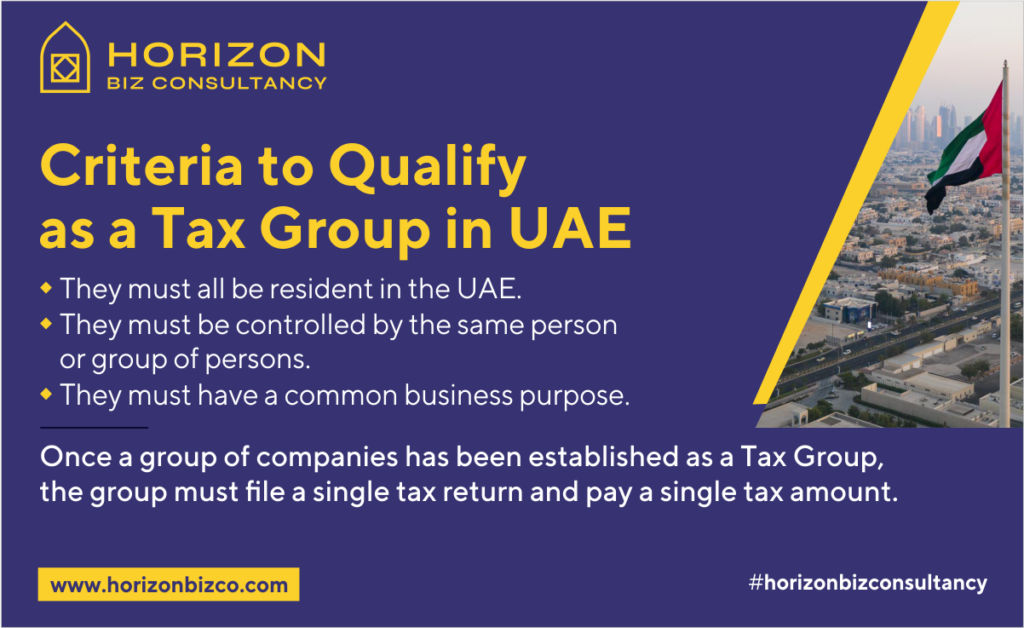Companies in the UAE will have to pay corporate tax starting June 2023. The standard statutory tax rate can be as high as 9% on yearly profits exceeding AED 375,000. But there are permitted ways for business groups, especially those with certain entities incurring losses, to lower their overall tax spend.
In this guide, our corporate tax consultants in Dubai explain two key concepts:
- Tax Groups
- Tax Losses
We also discuss how to utilize them through proper compliance for optimizing tax liability.
What is a Tax Group?
A tax group refers to two or more companies that are combined into a single taxable person under the UAE corporate tax law. This essentially means:
- The profits and losses made by all group companies are consolidated
- Instead of separate tax returns, only one combined return is filed for entire group
When is a tax group useful?
Tax groups provide major benefits for business groups – where ownership across entities is common – since losses of one unit can be offset against another unit’s profits to arrive at a lower net taxable income.
Typical examples are:
- A retail group with separate companies for different brands
- A manufacturing firm with separate entities for production and sales
- A healthcare provider running hospitals and clinics under different legal entities
As long as common ownership criteria are met, these companies can form tax groups.
Key Benefits of Creating Tax Groups
The major advantages are:
Adjust Losses to Reduce Profits
- If Company A makes a profit of AED 300,000 and Company B faces losses of AED 150,000 – the net taxable income on consolidated basis will only be AED 150,000.
- Compared to paying 9% tax on AED 300,000 without grouping – which would be AED 27,000.
Carry Forward Previous Losses
- Tax groups allow you to offset losses brought forward from previous years too, without any expiration limits.
- So high profits in a particular year can be adjusted against past losses of other group entities.
Lower Compliance Requirements
- Instead of managing tax computations and filings for each company, combining into single taxable person leads to consolidated compliance.
What is Needed to Create a Tax Group?
To qualify for tax grouping, the key requirements are:
- Common ownership – The percentage criteria depends on whether UAE/GCC vs. foreign ownership. Needs to be at least 50-75% common across group.
- Control – There should be consolidated control in terms of management and decision making
- UAE location – All companies within group must be tax resident in UAE
- Same financial year – Balance sheet dates across companies should align
- Approval required from regulatory authorities in some cases
- Time-bound application to be submitted to the Federal Tax Authority before first year filing
How Can Tax Losses Be Used to Optimize Liability?
Net operating losses arise when a company’s allowable deductions exceed its revenues in a tax year. Such losses can provide major tax savings in two ways:
1. Carry Forward by Company
- Losses can be set off against own profits made in future years, without any expiration limits.
2. Transfer to Group Companies
- As part of consolidated tax grouping, losses can be adjusted against profits of another group entity
Effective Planning is Critical
- Detailed forecasts of profit and loss across group entities should be prepared
- Analyse expected surpluses and deficits over next 5 years
- Structure tax groups accordingly so that losses provide optimal benefit
Proactive modelling and compliance helps sustainably reduce tax liability.

What Pitfalls to Avoid with Tax Grouping?
While tax groups provide major savings, businesses should also know:
Lock-in Period
- Companies cannot leave the tax group for at least 3 years after joining. So membership should be carefully considered.
Reorganizations Impact
- If ownership percentages change due to mergers or acquisitions – it can impact loss offsets
Arm’s Length Transactions
- Transfer pricing regulations still apply for all transactions between group entities
Overall, tax grouping decisions should factor in long-term business plans to maximize upside.
Conclusion
Forming tax groups and utilizing prior losses via consolidated compliance are two powerful ways business groups can potentially lower corporate tax spends in the UAE. Our consultants can advise on optimal group structures and planning strategies across holdings, operating firms, special purpose vehicles and other entities keeping in mind commercial objectives.
FAQs
Yes, as long as the majority ownership and control conditions are fulfilled. The location of companies does not matter.
You should assess eligibility, run forecast models and apply for tax grouping before the first year filing deadline to avail benefits immediately.
Exit is only permitted after the 3 year lock-in period. So members must evaluate long term plans carefully before applying for group registration.





